- Joined
- 28 August 2022
- Posts
- 7,232
- Reactions
- 11,804
Hoggets also. Have one here at the moment that nobody is claiming. Calling it lamb chops.Good afternoon
The best and cheapest beef is your neighbours … ha ha ha ha ha
Kind regards
rcw1
Hoggets also. Have one here at the moment that nobody is claiming. Calling it lamb chops.Good afternoon
The best and cheapest beef is your neighbours … ha ha ha ha ha
Kind regards
rcw1
As a cattle producer I am a price taker not price setter, though i would to be one.Are you comparing farm gate prices to the price for a retailer that has to rent a large store, pay 10-50 staff, have food trucked in every 1-3 days, energy costs for refrigerating 1/4 of the store etc and expecting them to be closer to your asking price?
The title of the thread isn't "the state of the economy at the farm level"
I just googled "how much margin does woolworths make on meat" and found this article from 2008, farmers think stores making >100% margin on mince, woolworths reckons they make a bit less than 2% gross margin before accounting for all the costs of running a store.

A beef with pricing
Finger pointed at Coles and Woolies for high Australian beef prices.www.smh.com.au
Right on the money Mick even 10% is being a bit generous.my point is that the farmer is quoting his farm gate price, i.e. the price he gets after all his inputs.
It is the equivalent of the retail price.
if you want to compare apples with apples, then you need to compare the gross margins of both.
If you go back and read your own post, you were the one who said gross profit for the meat was 2%, and posted a link to an article that you intimated supported that comment.
I went and read the 15 year old article you linked, and could not find any mention of a 2% gross profit.
I will happily stand (or sit) corrected if you can show me where it is.
The closest i could find was Woolies saying they get 1.70 per kilo gross margin.
It also states that the live weight per kilo farm price at the time was 1.68.
Depending on lots of variables, the live weight converts to about 65% of the live weight, so to compare apples to apples, that equates to 2.80 carcass weight.
If the farmer is only a beef producer, then all of his costs are going to come out of that 2.80 per kilo.
he has no loss leaders, no home brands etc to spread his costs over.
How do you know the margin on meat is closer to the average?
D o you have anything to back it up?
If it was indeed true, then the margin would be closer to the 26 to 30% margin that is quoted in the intelligent investor article.
As someone who raised cattle for a few years, I can tell you that the gross margins for the farmer is even in a good year is less 10%, and in some years you make a loss, especially if buying store cattle to raise rather than breeding your own.
Mick
The supermarkets poorest cuts prices are not anywhere near what we get as a whole and their top of the range cuts are right up there.
Of course we don't buy meat and have the luxury of having the very best on our table when we want it.
Straw man. You brought up the supermarkets, you brought up the 2% gross margin, without any proof, and now having shown to be knowing nothing about beef farming you want me to justify another unrelated question?Let me try to simplify my point for you and @mullokintyre with a simple question ...if you guys think the supermarket meat prices are excessive due to greed or whatever, do you think the prices at the three local small business butchers near me (all slightly more expensive than supermarket pricing) are also guilty of the same greed/gouging/whatever behaviour?
Just a yes or no.
Can't be a yes or no. Simply put individual butchers do not buy in the volume that a supermarket does.Let me try to simplify my point for you and @mullokintyre with a simple question ...if you guys think the supermarket meat prices are excessive due to greed or whatever, do you think the prices at the three local small business butchers near me (all slightly more expensive than supermarket pricing) are also guilty of the same greed/gouging/whatever behaviour?
Just a yes or no.
Investor boy you seem to me to something of an expert in this fieldLet me try to simplify my point for you and @mullokintyre with a simple question ...if you guys think the supermarket meat prices are excessive due to greed or whatever, do you think the prices at the three local small business butchers near me (all slightly more expensive than supermarket pricing) are also guilty of the same greed/gouging/whatever behaviour?
Just a yes or no.

From the perspective of consumers, you'd have to be doing reasonably OK financially to be buying steak anywhere these days.
As for small shops versus supermarkets, not all but a decent portion of consumers are going to be seeking out whoever's cheapest given the current overall situation with inflation etc.
The meats terrible at supermarkets.My concern as a consumer is if the local butcher went out of business.
Then I'd be forced to buy the awful, so-called cheaper meat from supermarkets.
The horror of even thinking about that.
Not when you can sometimes get it for as low as , 1/10 th the price. ( sic ) You have to write down the use-by dates and then rock up every weekday an hour or so before closing time . ( It's profitable walking time for this cheapskate ! ) Like my favourite fishing spots , this info, I like to keep to myself.The meats terrible at supermarkets.
Investor boy you seem to me to something of an expert in this field
Just a simple yes or no, have you ever been involved in the red meat industry as a producer ????
But the last two years there was gouging going on imo.
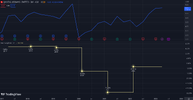
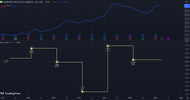
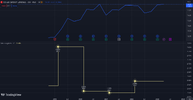
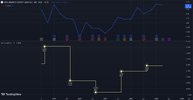
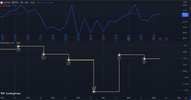

Yep, if you check the annual report Woolies and coles operate on about a 3% profit margin on sales once all other factors are considered, and that’s considered pretty good in that industry.Are you comparing farm gate prices to the price for a retailer that has to rent a large store, pay 10-50 staff, have food trucked in every 1-3 days, energy costs for refrigerating 1/4 of the store etc and expecting them to be closer to your asking price?
The title of the thread isn't "the state of the economy at the farm level"
I just googled "how much margin does woolworths make on meat" and found this article from 2008, farmers think stores making >100% margin on mince, woolworths reckons they make a bit less than 2% gross margin before accounting for all the costs of running a store.

A beef with pricing
Finger pointed at Coles and Woolies for high Australian beef prices.www.smh.com.au
Aldi is good, I like the onion rings from the frozen section. But I couldn’t do my full shop there. They don’t have the brands I like.My opinion and it is mainly anecdotal is, Woolies and Coles are struggling with an outdated legacy operating model, Aldi is eating their lunch where they are in direct opposition.
It is a bit like all long established businesses, adapting to rapidly changing technical disruptors and reducing you workforce appropriately when there are well established and entrenched work practices, isn't an easy feat.
I notice in Aldi, personnel is cut to the bone, variety and options cut to the bone, most of their trolleys are coin operated therefore returned.
I'm also noticing similar low staffing levels in a new local shopping center pub, minimal staff, that have to pull drinks, clear tables, take and deliver food orders, they never stop moving.
But they are busy as hell and sell the cheapest beer in town, so very well patronised as compared to the older established pubs.
Its a bit like some people don't read the original thread message that started all this.Yep, if you check the annual report Woolies and coles operate on about a 3% profit margin on sales once all other factors are considered, and that’s considered pretty good in that industry.
It’s a bit like some people see the oil price go down 30% and they expect the petrol at the bowser to go down 30%, because they don’t factor in all the other fixed costs of transport, refining, retailing etc
No. But you fail to mention the petrol station is in fact gouging the price on in store items.Even if it's your opinion, you must be basing it on something...it probably shouldn't be something asinine like "I drill oil and I sell it for $0.5/L but I see at the petrol station it costs $1.5/L, the petrol station must be gouging the price".
No. But you fail to mention the petrol station is in fact gouging the price on in store items.
There's gouging going on. Just not looking at the metrics you are using.
I don't know what accounting tricks they are using in net profits.
What's the revenue doing year on year?
Hello and welcome to Aussie Stock Forums!
To gain full access you must register. Registration is free and takes only a few seconds to complete.
Already a member? Log in here.